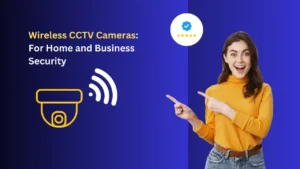In today’s evolving remote work culture, the question ‘Can My Boss Monitor Me on CCTV from Home?‘ has gained significant relevance. CCTV systems play a crucial role in maintaining security and operational efficiency in workplaces. However, the use of such surveillance raises important issues around employee privacy and data protection, prompting extensive debate and scrutiny.
This comprehensive exploration delves into the intricate legal landscape governing workplace surveillance, specifically addressing whether employers can monitor employees via CCTV from home. It provides insights into the rights and responsibilities of employers and employees, offering clarity on the permissible boundaries of surveillance practices in remote work environments. By navigating these complexities, this guide empowers individuals to understand their rights under current employment laws and navigate the delicate balance between security needs and personal privacy.
Understanding the Legal Framework
The legality of employers watching employees on CCTV from home is not a straightforward yes or no answer. Instead, it hinges on a delicate balance between an organization’s legitimate business interests and an individual’s reasonable expectation of privacy. Navigating this intricate terrain requires a thorough understanding of the relevant laws and regulations.
In the United Kingdom, several key pieces of legislation shape the boundaries of workplace CCTV monitoring. The Data Protection Act 2018 (DPA), the Human Rights Act 1998 (HRA), and the General Data Protection Regulation (GDPR) collectively aim to safeguard personal data and uphold fundamental rights to privacy.
The Data Protection Act 2018 (DPA)
The DPA is the UK’s implementation of the GDPR, a comprehensive set of rules governing the collection, processing, and distribution of personal data. In the context of CCTV surveillance, the DPA requires employers to disclose their monitoring practices, the reasons for such monitoring, and the intended use of the collected data.
Employers must also ensure that the surveillance measures are proportionate and necessary for achieving legitimate business objectives, such as enhancing security, improving operational efficiency, or enforcing health and safety protocols.
The Human Rights Act 1998 (HRA)
The HRA enshrines the right to privacy, extending its protection to public spaces and workplaces. While employers have the authority to implement surveillance measures, the HRA mandates that such measures do not infringe upon an employee’s reasonable expectation of privacy.
This means that certain areas, such as restrooms or designated break rooms, should be exempt from CCTV monitoring unless there are compelling reasons to do so, such as investigating suspected criminal activities.
The General Data Protection Regulation (GDPR)
The GDPR, which came into effect in 2018, further reinforces the principles of data protection and privacy. Under this regulation, CCTV footage is classified as personal data, and employers must adhere to stringent rules regarding its collection, storage, and processing.
Employees have the right to access CCTV footage in which they appear, subject to certain conditions. Employers must also maintain transparency about their data processing activities and implement appropriate technical and organizational measures to protect personal data.
Establishing Legitimate Reasons for CCTV Monitoring
Employers can legally monitor their employees through CCTV cameras if they can demonstrate legitimate reasons for doing so. These reasons may include:
- Enhancing Security: CCTV cameras can help protect employees, visitors, and property from potential threats such as theft, vandalism, or physical harm.
- Improving Operational Efficiency: Monitoring employee activities can provide valuable insights into workflow patterns, resource utilization, and areas for process optimization.
- Enforcing Health and Safety Protocols: CCTV surveillance can aid in ensuring compliance with health and safety regulations, identifying potential hazards, and investigating incidents or accidents.
- Investigating Suspected Misconduct: In cases where an employer has reasonable suspicion of employee misconduct, such as theft or breach of company policies, targeted CCTV monitoring may be justified as part of an investigation.
However, it is crucial for employers to conduct a thorough impact assessment before implementing CCTV monitoring. This assessment should weigh the potential benefits against the risks to employee privacy and ensure that the surveillance measures are proportionate and necessary for achieving the stated objectives.
Transparency and Employee Notification
Transparency is a fundamental principle when it comes to workplace CCTV monitoring. Employers are legally obligated to inform their employees about the presence of CCTV cameras, the areas under surveillance, and the purpose of the monitoring.
Clear signage, written policies, and open communication are essential to ensure that employees are aware of the surveillance measures and their rights. Failure to provide adequate notice can be considered a breach of data protection laws and may result in legal consequences.
Respecting Employee Privacy
While employers have the right to implement surveillance measures for legitimate purposes, they must also respect the privacy rights of their employees. This means that certain areas, such as restrooms, changing rooms, or designated break areas, should be off-limits for CCTV monitoring unless there are exceptional circumstances.
Employers should also refrain from excessive or intrusive monitoring practices that could be perceived as an invasion of privacy or a violation of trust. Striking the right balance between security needs and employee autonomy is crucial for fostering a healthy and productive work environment.
Employee Access to CCTV Footage
Under the GDPR and DPA, employees have the right to request access to CCTV footage in which they appear. This process is typically facilitated through a Subject Access Request (SAR), which employers must respond to within a specified timeframe.
Employers should establish clear procedures for handling SARs and ensure that employees are aware of their rights to access personal data. However, it is important to note that access may be limited or denied in certain circumstances, such as when granting access could compromise the privacy of others or jeopardize ongoing investigations.
Covert Surveillance and Targeted Monitoring
In exceptional cases, employers may resort to covert or targeted surveillance of specific employees. However, this practice is subject to strict legal requirements and should only be employed when there is a reasonable suspicion of criminal activity or gross misconduct.
Covert surveillance must be proportionate, time-limited, and conducted in accordance with established guidelines. Employers must also conduct a thorough privacy impact assessment and ensure that the surveillance impacts as few individuals as possible.
Data Retention and Security
Employers are responsible for ensuring the secure storage and proper handling of CCTV footage, which is considered personal data under the GDPR and DPA. They must implement appropriate technical and organizational measures to protect the data from unauthorized access, accidental loss, or unlawful processing.
Furthermore, employers must adhere to data retention policies and delete or securely dispose of CCTV footage once it has served its intended purpose or after a specified retention period has elapsed.
Workplace Policies and Employee Engagement
To foster a transparent and trust-based work environment, employers should develop comprehensive workplace policies that clearly outline their CCTV monitoring practices, the purposes of surveillance, and the rights and responsibilities of both parties.
Engaging with employees and addressing their concerns is crucial. Employers should provide channels for employees to voice their opinions, raise questions, or express concerns regarding workplace surveillance measures.
Remote Work Considerations
With the rise of remote work arrangements, employers face additional challenges in monitoring their employees while respecting their privacy rights. While certain monitoring tools and software may be employed to track employee activities, such as login times, emails, and online communications, employers must exercise caution and adhere to the principles of data protection and privacy.
Employers should develop clear remote work policies that outline the extent of monitoring, the reasons for such measures, and the safeguards in place to protect employee privacy. Open communication and transparency are essential to maintain trust and foster a positive remote work culture.
Seeking Professional Advice
Navigating the legal intricacies of workplace CCTV monitoring can be complex, especially in the face of evolving technologies and changing work environments. Employers are encouraged to seek professional advice from legal experts or data protection specialists to ensure compliance with relevant laws and regulations.
By staying informed and proactive, employers can strike the right balance between their legitimate business interests and their employees’ fundamental rights to privacy, fostering a secure and productive work environment built on trust and mutual respect.
At Nighthawk CCTV, we understand the importance of implementing legally compliant and effective CCTV systems. Our team of experts is dedicated to providing tailored solutions that meet your specific security needs while adhering to the highest standards of data protection and privacy. Contact us today to discuss your requirements and receive a free, no-obligation quote.
Conclusion
The question “Can My Boss Watch Me on CCTV from Home” is increasingly relevant in today’s remote work environment. Balancing legitimate business interests with employees’ reasonable expectations of privacy requires careful consideration of legal frameworks like the Data Protection Act 2018 (DPA), the Human Rights Act 1998 (HRA), and the General Data Protection Regulation (GDPR).
Employers can monitor employees via CCTV from home if they have legitimate reasons, such as enhancing security, improving operational efficiency, enforcing health and safety protocols, or investigating suspected misconduct. However, transparency is crucial; employers must inform employees about surveillance practices, respect designated private areas, and ensure that monitoring is proportionate and necessary.
In the context of remote work, addressing the question “Can My Boss Monitor Me on CCTV from Home” involves clear remote work policies, open communication, and employee engagement to maintain trust and privacy. Employers are encouraged to seek legal advice to navigate the complexities of workplace surveillance, ensuring a secure and productive work environment while respecting employees’ privacy rights.



